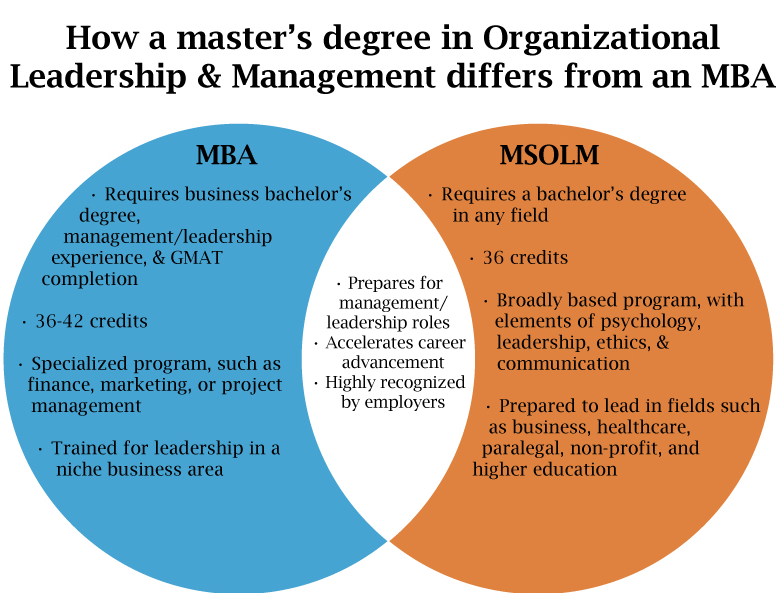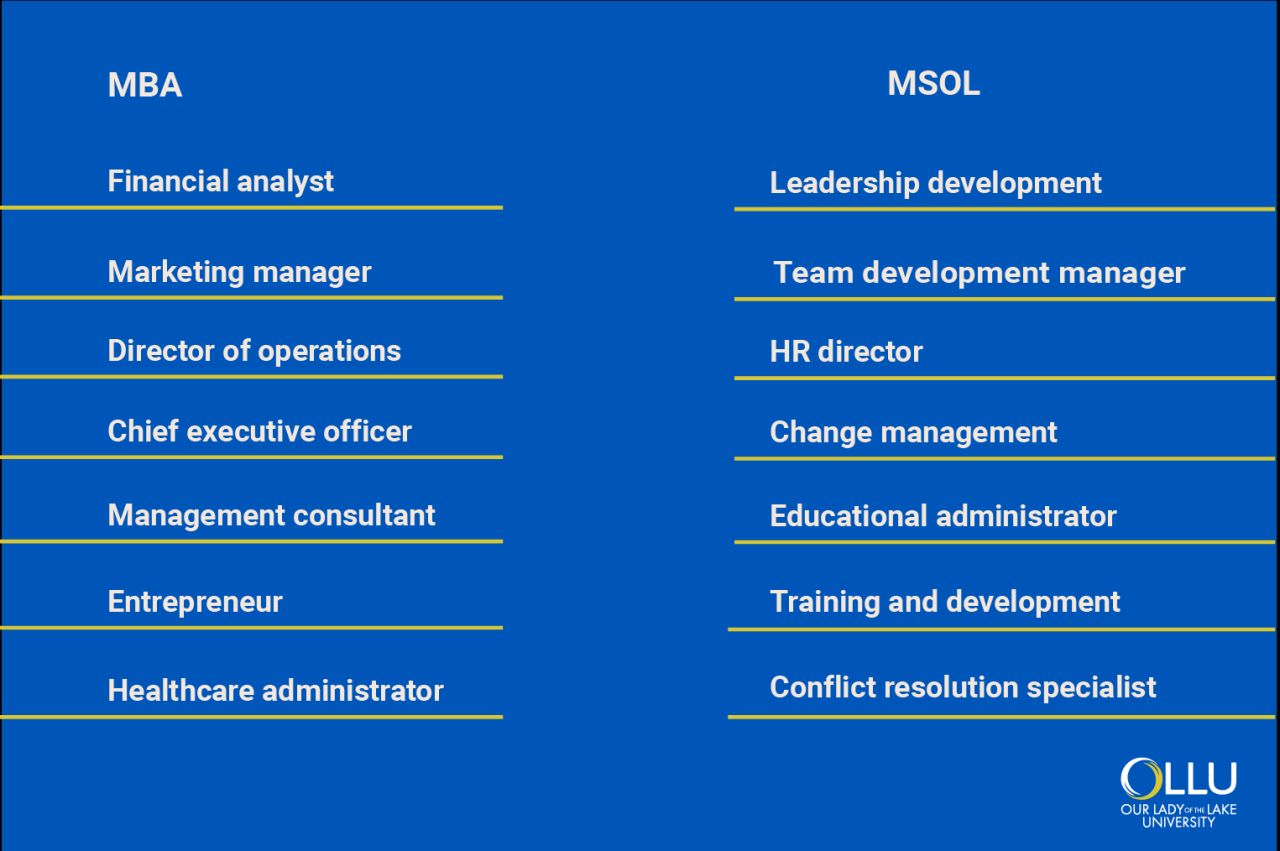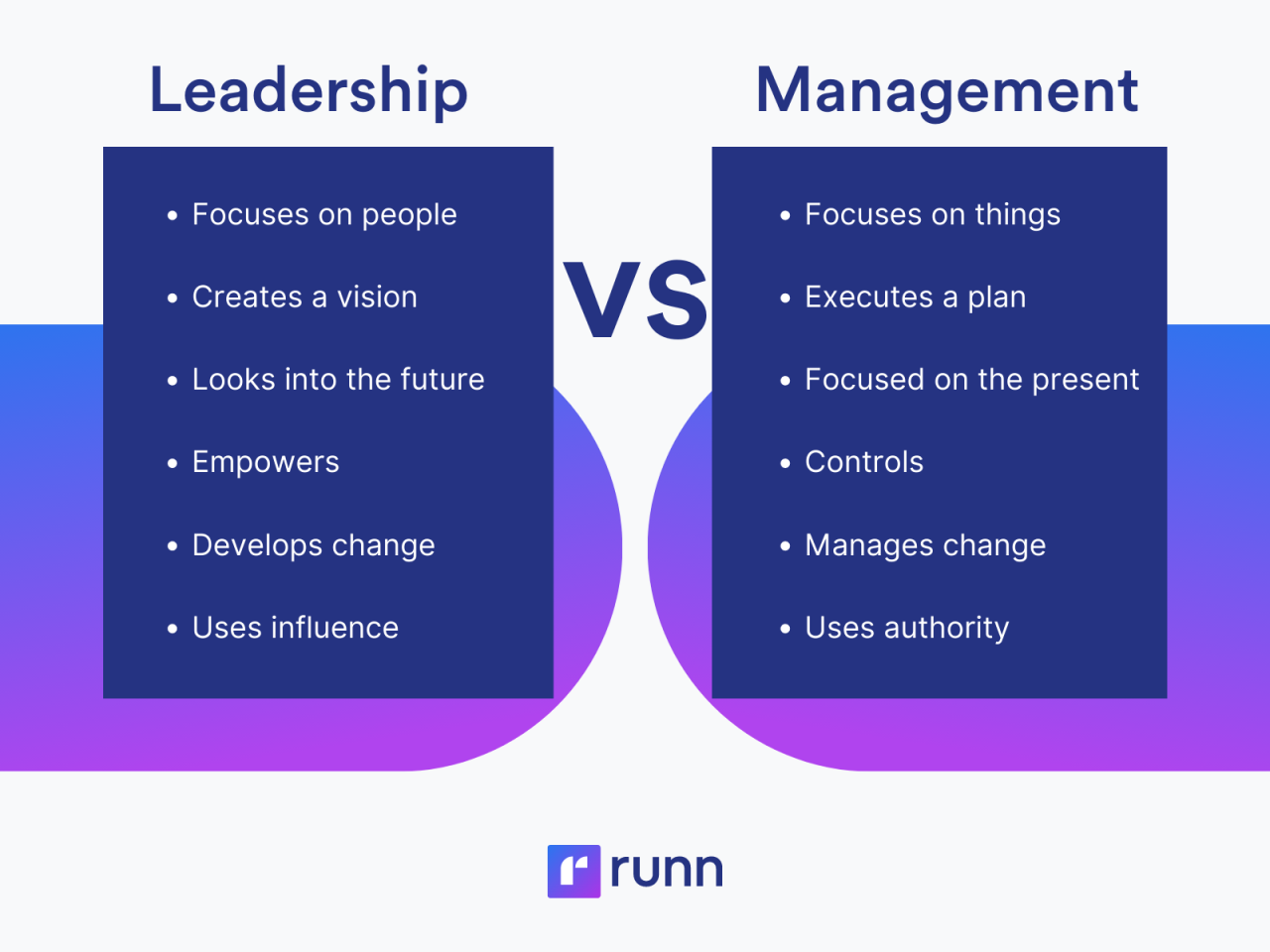In the realm of leadership development, the debate between organizational leadership programs and MBA degrees has long captivated aspiring leaders. While both paths promise career advancement, the nuances of each program shape distinct trajectories. Let’s dive into the world of organizational leadership vs MBA, exploring their career paths, skills acquired, and impact on leadership effectiveness.
Organizational leadership programs focus on developing practical skills and knowledge for managing teams and organizations. MBA programs, on the other hand, provide a broader business foundation with a focus on strategic decision-making and financial management. Understanding these differences is crucial for aspiring leaders to choose the path that best aligns with their career aspirations.
Organizational Leadership vs MBA

Career Paths
Individuals with organizational leadership skills can pursue a wide range of career paths, including:
- Executive leadership roles in various industries, such as healthcare, education, and non-profit organizations.
- Management consulting, where they advise organizations on strategy, operations, and organizational development.
- Human resources management, where they oversee employee recruitment, development, and retention.
- Training and development, where they design and deliver programs to enhance employee skills and knowledge.
- Organizational change management, where they guide organizations through major transitions and transformations.
Individuals with an MBA can also pursue a variety of career paths, including:
- Finance, such as investment banking, corporate finance, and portfolio management.
- Consulting, where they provide advisory services to businesses and organizations.
- Marketing, where they develop and implement marketing strategies to promote products and services.
- Operations management, where they oversee the day-to-day operations of an organization.
- Entrepreneurship, where they start and manage their own businesses.
Earning potential and growth opportunities vary depending on the specific career path and industry. However, both organizational leadership and MBA graduates can expect to earn competitive salaries and have opportunities for career advancement.
Skills and Knowledge Acquired

Organizational leadership and MBA programs equip individuals with distinct sets of skills and knowledge that impact their career trajectories. Both programs focus on developing core competencies, technical abilities, and soft skills, but with varying emphasis and approaches.
For those debating between organizational leadership and an MBA, consider exploring masters leadership development programs. These programs focus on developing advanced leadership skills, enabling individuals to lead effectively in complex organizational settings. While an MBA provides a broader business foundation, masters leadership development programs delve deeper into leadership theory, practice, and strategy, enhancing your ability to drive organizational success.
Core Competencies
- Strategic Thinking:The ability to analyze and synthesize information to make informed decisions that align with organizational goals.
- Communication:Effectively conveying ideas, information, and directives to diverse audiences.
- Problem-Solving:Identifying and resolving complex issues through analytical and creative thinking.
Technical Abilities
MBA programs typically emphasize quantitative and financial skills, including:
- Data Analysis:Using statistical techniques and software to extract insights from data.
- Financial Modeling:Developing and interpreting financial models to assess business performance and make investment decisions.
Organizational leadership programs, on the other hand, prioritize qualitative skills, such as:
- Stakeholder Management:Engaging and managing relationships with key stakeholders to achieve organizational objectives.
- Team Building:Fostering collaboration and developing high-performing teams.
Soft Skills
Both programs emphasize the importance of soft skills, including:
- Leadership:Inspiring, motivating, and guiding others towards a common goal.
- Emotional Intelligence:Understanding and managing one’s own emotions and the emotions of others.
- Adaptability:Responding effectively to changing circumstances and environments.
The impact of these skills on career advancement and professional development is significant. Individuals with strong leadership skills and technical abilities are highly sought after in managerial and executive positions. Those with soft skills are effective in building strong relationships, resolving conflicts, and creating a positive work environment.
Organizational leadership and MBA programs both focus on developing leaders, but they have different approaches. While MBA programs provide a broad foundation in business, organizational leadership programs focus specifically on the skills and knowledge needed to lead organizations effectively. If you’re interested in learning more about top leadership speakers, check out our list of top leadership speakers.
They offer insights and strategies that can help you develop your leadership skills and become a more effective leader.
Leadership Styles and Approaches

Organizational leadership programs focus on developing a comprehensive understanding of various leadership styles and approaches, while MBA programs primarily concentrate on business-related leadership theories.Organizational leadership programs delve into leadership theories like transformational leadership, servant leadership, and situational leadership. These theories emphasize the importance of inspiring and motivating followers, building strong relationships, and adapting leadership styles to different situations.On the other hand, MBA programs often focus on leadership theories that are more relevant to business contexts, such as strategic leadership, transactional leadership, and charismatic leadership.
These theories explore how leaders can effectively manage organizations, set strategic directions, and motivate employees towards achieving business objectives.The effectiveness of leadership styles varies depending on the organizational context and the specific challenges being faced. For instance, transformational leadership may be more effective in situations where innovation and employee engagement are crucial, while transactional leadership may be more suitable for environments that require clear direction and accountability.
Leadership Styles in Organizational Leadership Programs
- Transformational leadership: Focuses on inspiring and motivating followers, creating a shared vision, and fostering a positive work environment.
- Servant leadership: Emphasizes serving others, empowering followers, and creating a collaborative and supportive workplace.
- Situational leadership: Adapts leadership style to the maturity and competence of followers, providing support and guidance as needed.
Leadership Styles in MBA Programs
- Strategic leadership: Focuses on developing and implementing long-term strategies, setting organizational direction, and aligning resources.
- Transactional leadership: Emphasizes clear communication of expectations, rewards for performance, and corrective actions for underperformance.
- Charismatic leadership: Involves using personal charisma, charm, and enthusiasm to inspire and motivate followers.
Case Studies and Real-World Applications

In organizational leadership and MBA programs, case studies and real-world applications are essential tools for experiential learning. They provide students with opportunities to apply theoretical concepts to practical situations, develop critical thinking skills, and enhance their decision-making abilities.
Organizational Leadership Programs
Organizational leadership programs often utilize case studies to analyze specific leadership challenges within organizations. These case studies may involve ethical dilemmas, strategic planning issues, or team dynamics. By examining real-world examples, students can learn from the successes and failures of others and develop their own leadership approaches.
MBA Programs
MBA programs incorporate case studies and simulations to cover a wider range of business topics, including finance, marketing, operations, and strategy. These case studies typically focus on complex business decisions that require students to apply their analytical and problem-solving skills.
By working on these cases, students gain a deeper understanding of the challenges and opportunities faced by businesses in the real world.
Benefits of Experiential Learning
Experiential learning through case studies and real-world applications offers numerous benefits for leadership development:
- Enhances critical thinking and analytical skills.
- Develops problem-solving and decision-making abilities.
- Provides opportunities to apply theoretical concepts to practical situations.
- Fosters teamwork and collaboration skills.
- Improves communication and presentation abilities.
Program Structure and Delivery

Organizational leadership programs and MBA programs differ in their structure and delivery methods, each catering to distinct learning objectives and career goals.
Organizational leadership programs typically focus on developing leadership skills and knowledge specific to organizational settings, while MBA programs provide a broader foundation in business administration and management.
Duration
Organizational leadership programs are typically shorter in duration than MBA programs. They can range from one to two years, depending on the program’s intensity and the student’s pace of study.
MBA programs, on the other hand, typically require two years of full-time study or three to five years of part-time study.
Course Format, Organizational leadership vs mba
Organizational leadership programs are often offered in a hybrid format, combining online coursework with in-person classes or workshops. This flexibility allows students to balance their studies with work and personal commitments.
If you’re debating between organizational leadership and an MBA, consider an eds in educational leadership. This advanced degree focuses on the theories and practices of leading educational institutions, providing you with the skills to manage schools and districts effectively.
While organizational leadership and MBAs offer a broader scope, an eds in educational leadership tailors your expertise to the unique challenges of the education sector.
MBA programs are typically offered in a more traditional classroom setting, with students attending lectures, participating in discussions, and completing assignments on a regular schedule.
Assessment Methods
Organizational leadership programs typically assess student learning through a combination of assignments, projects, and presentations. These assessments focus on the application of leadership principles and skills in real-world settings.
MBA programs typically use a wider range of assessment methods, including exams, case studies, simulations, and presentations. These assessments are designed to evaluate students’ understanding of business concepts and their ability to apply them in practice.
Advantages and Disadvantages of Different Program Structures
The hybrid format of organizational leadership programs offers flexibility and accessibility, making them suitable for working professionals or those with busy schedules.
The traditional classroom setting of MBA programs provides a more structured and immersive learning experience, allowing for deeper engagement with faculty and peers.
Final Summary

The choice between organizational leadership programs and MBA degrees is a personal one, dependent on individual career goals and aspirations. Both paths offer valuable skills and knowledge for aspiring leaders, but the specific focus and emphasis of each program vary.
By carefully considering the nuances of each program, individuals can make informed decisions that will propel their leadership journeys forward.
FAQ Resource
What are the key differences between organizational leadership programs and MBA degrees?
Organizational leadership programs focus on developing practical skills for managing teams and organizations, while MBA programs provide a broader business foundation with an emphasis on strategic decision-making and financial management.
Which path is better for aspiring leaders?
The best path depends on individual career goals and aspirations. Organizational leadership programs are ideal for those seeking to develop practical leadership skills, while MBA programs are suitable for those seeking a broader business foundation.
What are the earning potential and growth opportunities for individuals with organizational leadership skills compared to those with an MBA?
Earning potential and growth opportunities vary depending on industry, experience, and individual performance. However, both organizational leadership skills and MBA degrees can lead to successful careers in leadership roles.